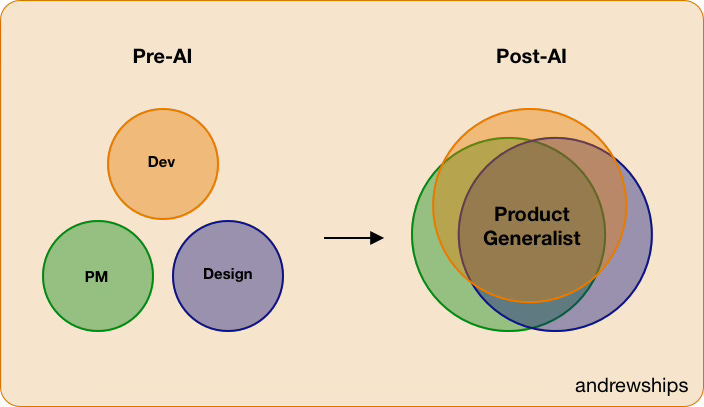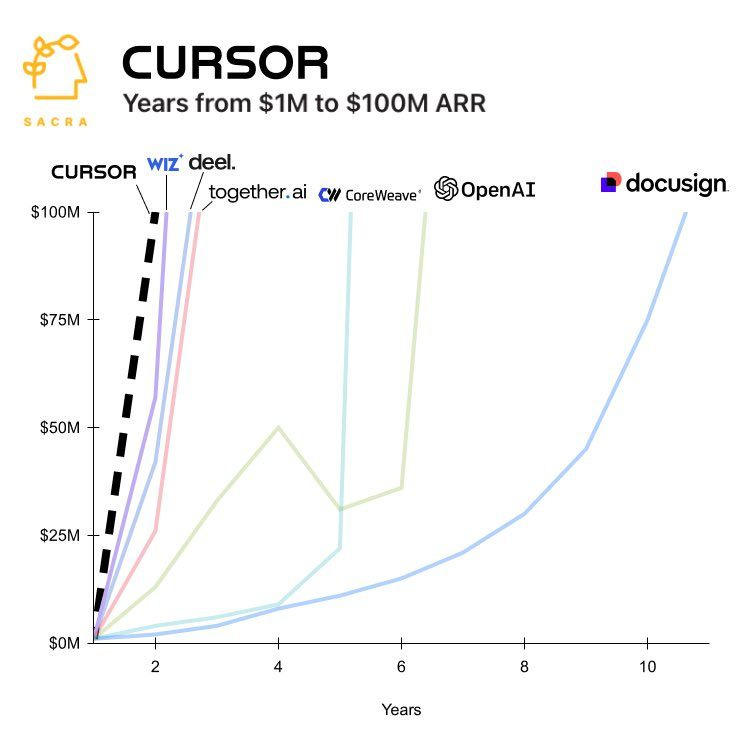Talent Collapse or Talent Evolution?
How will tech jobs play out in a post-AI world, and why Generalists will win
The Execs signal change, we should listen
Over the past 10 months the tech industry has been hit left and right with executives either signaling AI will replace jobs, or citations of AI-adoption as rationale for layoffs.
"Probably in 2025, we at Meta, as well as the other companies that are basically working on this, are going to have an AI that can effectively be a sort of midlevel engineer that you have at your company that can write code," Mark Zuckerberg, Meta
“We’re not adding any more software engineers next year because we have increased the productivity this year with Agentforce and with other AI technology…” Marc Benioff, Salesforce
“It is our job to create computing technology such that nobody has to program.” Jensen Huang, Nvidia
You may have also seen this graph from FRED floating around, which indicates a significant decline in developer jobs posted to Indeed since peak COVID:
Although none of this is exactly encouraging, I strongly suggest we keep in mind that the future is being created today. There’s two ways to read the tea leaves:
AI is replacing the old thing
AI is creating the new thing
Probably some of both will happen. But we tend to overemphasize #1 while just waiting around for #2 to reveal itself to us. Instead, let’s take a look at both futures right now.
Talent Collapse
As a thought experiment, let’s take the executives extremely seriously. We’ll model the effects of a permanent hiring freeze on entry and mid level developer roles globally. To do this we need to establish a few baselines / assumptions:
100% of the tech industry permanently freezes hiring on entry and mid level developer roles
There is ~26 million developers globally today
~30% of developers are senior and up
There is a 3% attrition rate for senior developers as they retire or leave the industry
How long until we experience talent collapse?
This chart visualizes the decrease in developer population overtime in blue, and the relative percent reduction in red.
The first 5 years or so the current entry / mid level devs can fill in for any senior attrition as they get promoted, so that period is stable. Then population decline kicks in.
10 years in ~15% of developer population is gone.
20 years in ~37% reduction
40 years in ~65% reduction
We need a talent pipeline
This very simple model can be improved upon in many ways (I’d love to see someone improve it). Even in this simple model we see the implications of halting the talent pipeline. Population decline kicks in after a few years, followed by a gradual collapse in global developer talent.
My view is that this would be untenable. It’s a chicken and egg problem. When all the developers retire, who’s going to maintain the AI?
Talent Evolution
The alternative, forward-looking way to read the tea leaves is to imagine a Talent Evolution. Tech jobs change, merge, diverge, adapt, and ultimately morph into something familiar but new.
Generalists Win
The most valuable talent today is the highly skilled developer who can also design and has business or product sense. Historically it’s way too much for one person to do all of this work, even if they are capable. But now, because AI dramatically speeds up the development process, it’s possible for one person to perform these three functions meaningfully.
These types of jobs do not exist. Not really. The people that end up doing this type of work are almost always founders. Whether out of necessity or sheer talent, Founder is one of the few roles that asks this much of an individual. As the industry continues down the Post-AI track, I expect to see something like “Product Generalist” begin to pop up as a job function.
Everyone is a manager
In the (near) future, management will be a responsibility everyone, including individual contributors. Instead of managing people, they will manage AI. Whether the AI is designed as simple prompt chains, or highly autonomous fleets of agents, it will need to be managed.
The output of the AI will need to be evaluated, and feedback will need to be given to the AI regularly. This is the type of management ICs will conduct, at a minimum. Human-in-the-loop workflows ensure quality in output as well as efficiency in production. Start practicing your AI management abilities now, because you’ll be doing lots of it in the future.
Juniors will do more
Instead of Junior and Mid level roles disappearing, I believe they will be elevated. The bar has been raised for everyone, and entry level roles are no exception. In the case of software development, junior developers will be expected to build entire applications with the help of AI. They will be expected to conduct system design and understand the tradeoffs between various architectural patterns.
The days of a junior developer solving simple logic problems as a legitimate contribution are numbered. Instead they will be expected to:
Act as a generalist
Manage the AI
Contribute significantly more value
Articulate or bust
Communication skills have always been important, and today they are more important than they’ve ever been. In order to effectively draw value from AI, we must be able to articulate the desired outcome with specificity. Those we can do this well produce more value faster. Those who do this poorly fall behind as they wrestle with the AI to squeeze out some semblance of the desired output.
One’s ability to clearly articulate their desired outcome is dependent on their own understanding of:
The outcome itself
How the outcome can and should be achieved
The tradeoffs between alternative approaches of achieving the outcome
This is perhaps the biggest clue as to what the talent pipeline will look like in the future. While AI will execute more of the work, the seniors will have the ability to ask more of the AI while the juniors will only be able to successfully ask for much small scopes of work.
Team size shrinks
When your team is filled with generalists that are highly skilled at managing AI, you won’t need a large team to accomplish incredible things. This is already happening and perhaps most evident in Cursor’s meteoric rise to $100m ARR. They have become the fastest company to achieve this milestone with a team of around 20 people.
Conclusion
The future of tech isn’t about whether AI replaces jobs—it’s about how AI reshapes them. While a total talent collapse is unlikely, an industry-wide talent evolution is already in motion. Those who can adapt will thrive. The old paths to success may be closing, but new ones are opening for those willing to navigate them.







I’m excited about the possibility of more solo founders thanks to AI. As a one person business, you can accomplish a lot more on your own with the help of AI.
Thanks for sharing the insight~ Dev, PM and design can all transition into product generalist.
I’m also a big believer in generalist leveraging AI to do amazing things that previously only a big team can do.
Whoever realizing this and start learning and building with AI will have a huge advantage. I think it’s still early.